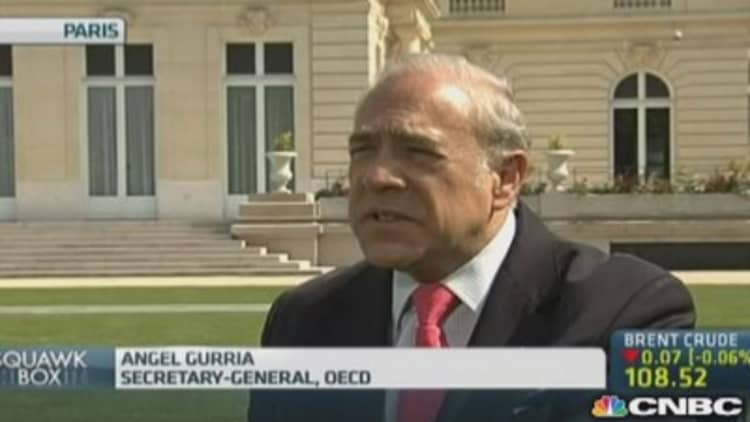
There has been a failure to ensure that economic growth is inclusive and Organization for Economic Co-operation and Development (OECD) countries should focus on job creation and maintaining public spending even when budgets are tight, said OECD chief Angel Gurria.
"In the first three years of the global financial crisis, inequality in the OECD countries grew more than in the 12 years before that," Gurria told CNBC ahead of an OECD gathering in Paris this week at which growing inequality is a key theme.
"You have to focus on creating jobs and allow even in very tight budgets for elements in public spending that will support this [addressing inequality]," he added.
According to the OECD, inequality is growing and distribution of burdens and rewards across society has become more uneven.
The richest 1 percent has gotten significantly wealthier in most countries over the past three decades, with the most speculator rise seen in the U.S., the OECD said in a new report last week.
Read MoreUS 1% captures greatest slice of income pie: OECD
A book published in 2013 by French economist Thomas Piketty called 'Capital in the Twenty-First Century' has stoked the inequality debate.
In the book, which is at the top of Amazon's best sellers list, Piketty outlines the evolution of inequality since the start of the industrial revolution. He argues that the main driver of inequality – a tendency of returns on capital to exceed economic growth rates – threatens to fuel extreme inequalities.
Read MoreEmerging economies hurting global growth: OECD
Asked whether OECD members should enact higher taxes for the rich and corporations, Gurria said: "Some of them have already done that and in many cases this is being attempted."
He added: "What about the multi-nationals? They don't pay taxes in their home country, they don't pay taxes in the places where they operate, they take it to some European station which then takes it to some Caribbean station and they end up paying zero. This is no longer possible."
A number of multi-national firms have come under scrutiny in the past year for tax evasion. The European Union for instance is analyzing tax deals several European countries offered large corporations such as Starbucks and Apple.
The OECD is made up of 34 countries including the U.S., Japan, France, Germany, the U.K. and Australia. Its mission is to promote policies that enhance economic and social well-being around the world.

